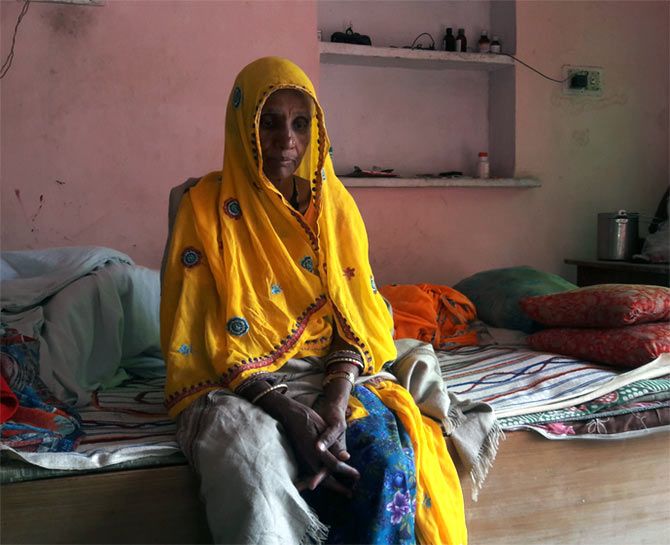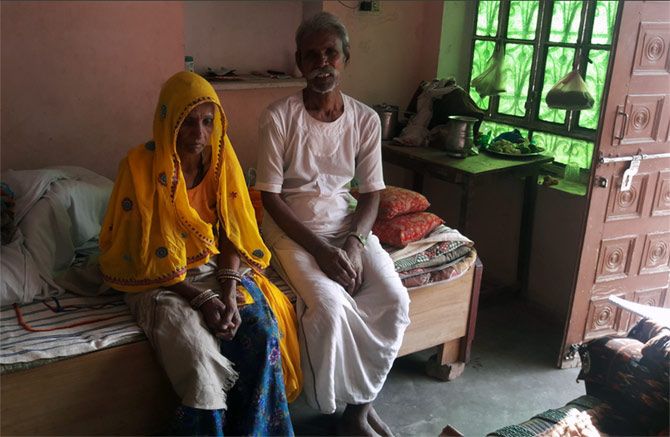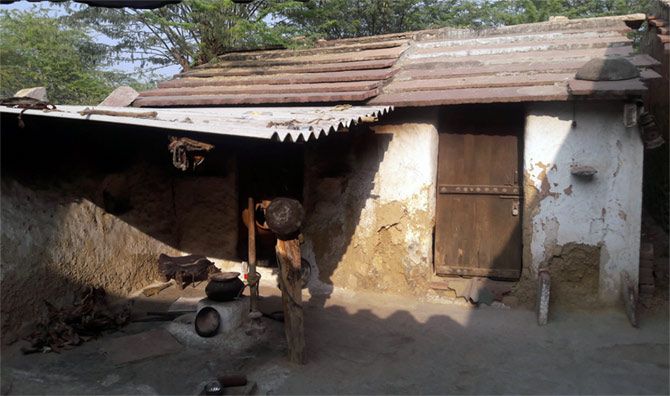For more than 23 years, Bhanwari Devi, who was gang-raped for speaking out against the marriage of two babies, has been fighting a lonely battle for justice.
Rashme Sehgal traveled to Dausa in Rajasthan to meet the courageous woman, a winner of the Neerja Bhanot Award for bravery, a symbol of Indian women's struggle.

An ailing Bhanwari Devi clutches the bannister with trembling fingers as she climbs up the steps leading up to her house.
She has been suffering from typhoid for the last six weeks and a bus trip to a doctor in the nearby mofussil town of Dausa has drained her of her energy.
Her daughter Rameshwari helps her up the steps and makes her lie down on a wooden bed while her husband Mohan offers her a glass of water.
Bhanwari Devi, who is a Dalit by caste, became an icon of the women's movement when she decided to go public and fight her case following a gang-rape by five upper caste Gujar men following her attempt to stop a child marriage in her village of Bhateri located 45 km south of Jaipur.
This happened on September 22 1992 and she has been fighting for justice ever since, to little avail.
Bhanwari Devi had been employed as a sathin (friend) for the Women's Development Programme being run by the Rajasthan state government.
Sathins are grass-root workers who work for the upliftment of villagers in the areas of literacy, health and sanitation.
At the time of the rape, she was being paid Rs 200 per month. She presently earns Rs 2,100 every month.
Despite having filed an FIR (first information report) at the Bassi police station nearby and then having her vaginal swab conducted at a Jaipur hospital 52 hours after the rape (which confirmed the semen of the five men who had raped her), she says, "I fought for justice, but I regret that I have not received justice."
"If I had received justice, at least my standing in my village would have gone up. I am a social outcaste and will remain one till the day of my death," she says, visibly upset.
Her reference is to the verdict deleivered in her case by the district sessions judge in November 1995. Her case was dismissed on the grounds that upper caste men could not rape low caste women. The judgment also questioned how her husband could be a mute spectator to his wife's rape.
Mohan, who is sitting next to his wife, intervenes. "We were both working in the fields when five Gujars raped her. Two men pinned me down while the others took turns to commit this heinous crime. I went into a state of shock and depression. It took me several months to come out of it."
"At that point," he adds, "I believed we would get justice. That would have helped restore our sense of honour. Unfortunately, we have lost both our honour and self respect."
"People think you can restore your sense of honour by them giving you money. Unfortunately, after facing 22 years of ostracism by the villagers of Bhateri, I wonder if this battle has served any purpose."

"We have both become old and bitter. My wife was an illiterate woman. She was simply doing her job when she was tried to stop the marriage of a nine-month-old baby to a one year old. She complained to the police who came and stopped the marriage. But it took place the next day."
"The irony is that child marriages continue unabated throughout Rajasthan. After how Bhanwari was treated, which sathin will stick her neck out?" asks Mohan.
"Bhanwari was performing her duty. Unfortunately, she received no support from the state government," Mohan adds.
A potter by profession, the villagers stopped buying his pots and the social boycott continues to this day.
He owns one bigha of land. But his land lies fallow because he lacks the means to irrigate it.
"The monsoon has become erratic. I have to buy my water from farmers who owns tube wells. A single crop needs to be watered six times before it is harvested," Mohan explains. "One round of watering costs me Rs 1,000. Since I do not have the money, my land lies idle."
This is not to say that Bhanwari did not receive the support of activists and the media. Both groups rallied around her and spearheaded a campaign to highlight her cause so that she could receive justice.
Bhanwari feels all those interviews served little purpose. "I have been given so many interviews," she says. "The powerful and mighty have come to me and made such tall promises. 'We will help you rebuild your house.' 'We will help to educate your children.' Others promised to dig a tube well in our land. Not one of those promises materialised. It leaves you feeling betrayed."
Bhanwari Devi has aged. Her hair is white. Her body is frail. Mohan, who has been a pillar of support to her, has also aged. I had interviewed them in 1992 when they lived in a mud house. They have managed to build two pucca rooms though the rest of their house is run down.
Mohan is proud that he has been able to build a toilet and bathroom at a cost of Rs 100,000 for which he has received no reimbursement from the Rajasthan government despite villagers being told that they would receive Rs 13,000 under a ministry of rural development scheme.
Mohan ekes out a living working as a labourer under the Mahatma Gandhi National Rural Employment Guarantee Act, but the last few weeks have been devoted to taking care of his sick wife.

Following the district court's judgment, women groups rallied around Bhanwari Devi. Kavita Srivastava of the People's Union for Civil Liberties played a key role in taking her case to the Jaipur high court.
"We went into an appeal in the high court in February 1996. Despite the CBI (Central Bureau of Investigation) finding all her allegations to be correct and demanding an early hearing, we have been told that the appeals pending before the high court go back to the '80s," says Srivastava.
"There is a backlog of 1,180 appeals which have to be disposed off before her case will be heard," adds Srivastava.
Despite being remonstrated by Rameshwari, who pleads with her mother not to tire herself further or her "blood sugar" will shoot up, Bhanwari talks about the ostracism she faced at the hands of people from her caste who believed she had become a "polluted and fallen" woman.
After her father's death, her relatives did not serve her food at the funeral. Bhanwari Devi spent Rs 25,000 she received from then prime minister P V Narasimha Rao and organised a Kumhar (potter) caste panchayat to ensure the community accepted her.
"We continue to be ostracised in the village," says Mohan. "We are not invited for weddings or funeral ceremonies. My children used to feel very hurt when their mother was called names. They have reconciled themselves to it now."
Bhanwari has four children. While her eldest daughter has not been educated, her two sons, who live in Jaipur, do menial jobs. She is extremely proud of her youngest daughter Rameshwari, who graduated and has a BEd degree. She presently teaches English in a school.
Bhanwari has deposed before the National Commission of Women. She was also awarded the Neerja Bhanot Award which praised her for 'braving economic penury, social ostracism and isolation in the village. She faced an economic blockade with unlimited courage.' The award gave her a cash prize of Rs 100,000.
Some years ago, she was invited to Ahmedabad to address a gathering of intellectuals who were discussing the Vishaka Guidelines. Because Bhanwari chose to go public about her gang-rape, her case has become a landmark in more ways than one.
The Vishaka Guidelines, whereby the Supreme Court listed how an employer must respond to complaints of sexual violation at a work place, have come about only because of her willingness not to brush her rape under the carpet.
Five women organisations took the Rajasthan government to court following her gang-rape. In August 1997, the Supreme Court listed the process both government offices and private companies must follow if a female employee complained of sexual harassment.
For Bhanwari Devi, this is nothing more than one more cruel joke. "Look at the large number of people who rallied around the young girl in the Nirbhaya case. They even succeeded in changing the rape law. All I have done is plead for justice and I have failed to get it."
She may sound bitter, but she remains a pillar of strength with a large section of Dalit women in her village asking her to her to intervene in land disputes and in domestic violence cases.
"She has emerged as a leader in her village," says Kavita Srivastava. "Women from neighbouring villages flock to her, seeking her advice on several issues. She lives in penury, but many people have taken heart from her struggle. Sadly, she is not one of them."
Bhanwari Devi feels time is running out foer her. "I do not know if I will receive justice in my lifetime," she says in a whisper. "I have become so weak I do not know if I will live to see another day."










